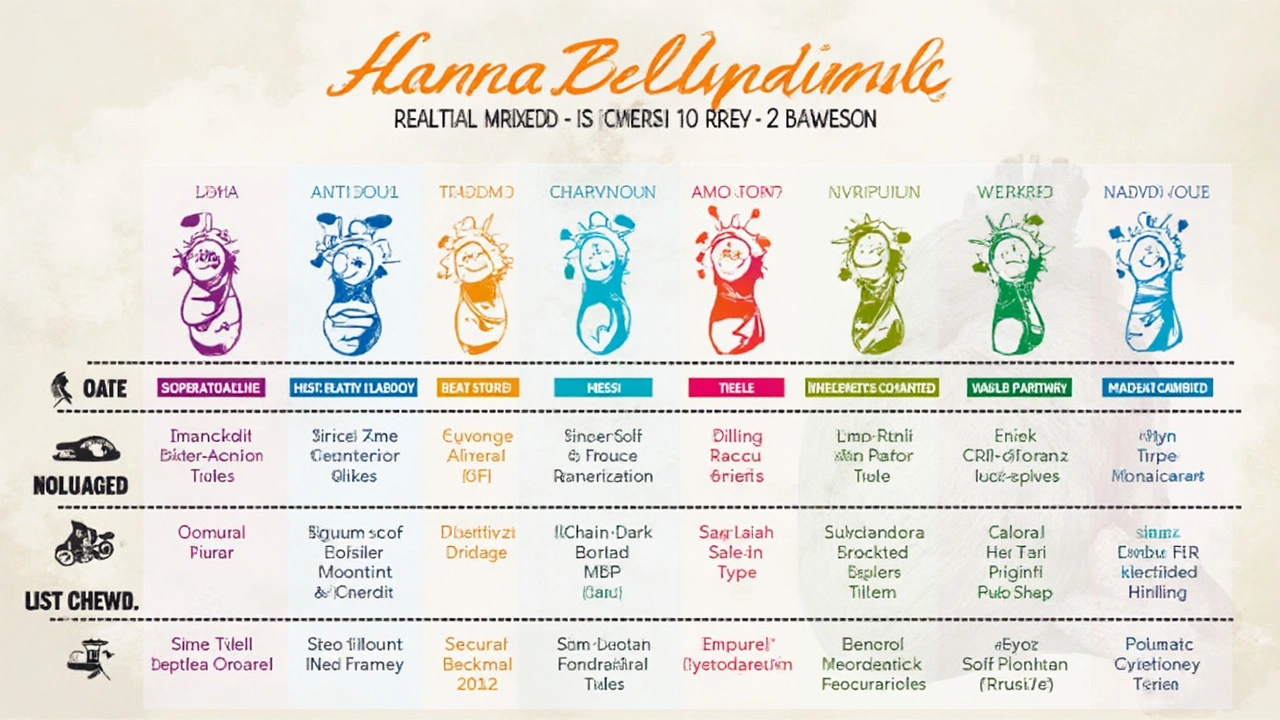Finding the right medication can sometimes feel like looking for a needle in a haystack, especially when balancing pros and cons for specific health issues. If you're exploring alternatives to Verapamil, you're in good company in 2025. Verapamil's a go-to for tackling hypertension and heart-related conditions, but it's not the only option out there.
The good news? There are quite a few alternatives to explore that might suit your needs better, depending on your health goals and the advice of your healthcare professional. We'll look into Hydrochlorothiazide first—a reliable teammate in the fight against high blood pressure and cardiac conditions.
- Hydrochlorothiazide
- Amlodipine
- Diltiazem
- Losartan
- Metoprolol
- Bisoprolol
- Atenolol
- Nifedipine
- Comparison and Conclusions
Hydrochlorothiazide
Hydrochlorothiazide, often abbreviated as HCTZ, is a popular choice in managing hypertension and fluid retention issues. It's a type of thiazide diuretic, meaning it helps your body get rid of excess sodium and water, thereby reducing blood pressure and easing strain on your heart.
This medication is well-regarded as an effective partner in the fight against hypertension. It's often one of the first options doctors reach for, thanks to its track record of effectiveness and affordability.
Pros
- Inexpensive first-line option: One of HCTZ's biggest draws is its low cost, making it accessible even for those on a tight budget.
- Effective for hypertension: It has proven success in lowering blood pressure, contributing to better heart health overall.
- Reduces cardiovascular risk: By managing hypertension, it helps cut down the risk of heart attacks and strokes.
Cons
- Electrolyte depletion (hypokalemia): A downside is its tendency to lower potassium levels, so regular monitoring might be necessary.
- Increased uric acid (gout risk): Those prone to gout might see an increase in symptoms due to higher uric acid levels.
- Less effective in advanced kidney disease: This medication may not work as well if kidney function is already compromised.
While Hydrochlorothiazide stacks up as an effective and economical option, it's essential to weigh these pros and cons. Chatting with your healthcare provider about how it fits your personal health profile is a great step towards making an informed choice.
Amlodipine
When it comes to dealing with hypertension and heart issues in 2025, Amlodipine is a heavy hitter worth knowing about. This medication is a type of calcium channel blocker, much like Verapamil. It works by relaxing blood vessels, making it easier for your blood to flow and reducing your blood pressure. Sounds helpful, right?
What's especially cool about Amlodipine is its long-lasting effect. You only need to take it once a day, which is super convenient for those of us who forget those lunchtime doses. It's particularly effective in lowering blood pressure, reducing chest pain (angina), and improving survival after a heart attack.
Pros
- Convenient once-a-day dosage.
- Effective for both blood pressure and angina.
- Helps improve survival rates post-heart attack.
Cons
- Can cause swelling in the legs or ankles.
- Potential for dizziness as a side effect.
- May lead to palpitations in some cases.
There's a bonus if you dig numbers. According to the NHS, nearly 12% of the UK population has leaned on Amlodipine as a means to keep their blood pressure in check. This usage highlights how essential it is in comprehensive cardiac care here in the UK.
In the grand scheme of medication options, Amlodipine is like that dependable mate who's always got your back—it's tried and tested, offering a reliable alternative if Verapamil isn't cutting it for you.
Diltiazem
Diltiazem is another heavy hitter when it comes to managing heart health. It's pretty similar to Verapamil in that it's also a calcium channel blocker but offers its own unique perks and quirks. What does it do? Well, it relaxes the heart muscles and the blood vessels, which helps lower blood pressure and makes it easier for the heart to pump.
This comes especially handy for treating conditions like angina and certain heart rhythm disorders. It's like giving your heart a bit of a break, allowing it to perform more efficiently. The nifty part? Its versatility with tackling both heart rate and blood pressure issues without leaning too heavily on one side.
Pros
- Effective in reducing high blood pressure and managing angina
- Widely available and well-studied
- Flexible dosing options
Cons
- May cause side effects like dizziness or swelling in certain people
- Not suitable for patients with some heart conditions like heart block
- Requires regular monitoring, especially in patients with liver or kidney conditions
Just like any medication, Diltiazem isn't free from quirks. It can lead to side effects such as dizziness and swelling, so keeping an open line of communication with your doctor is crucial. Plus, it's not the best choice for everyone, particularly those with some existing heart conditions. It makes regular check-ups and monitoring all the more important to ensure it's working as needed without any surprise issues popping up. All in all, if you're keeping tabs on both your blood pressure and heart rhythm, Diltiazem might be a solid alternative that's worth discussing with your healthcare provider.
Losartan
If you're hunting for an alternative to Verapamil, Losartan might be hanging out near the top of your list. Prescribed primarily for high blood pressure and certain heart conditions, this medication belongs to a class of drugs known as angiotensin receptor blockers (ARBs). It helps relax blood vessels, making it easier for your heart to pump blood around. Cool, right?
One of the real reasons people lean towards Losartan is that it's particularly effective in reducing the risk of stroke in patients with high blood pressure and an enlarged heart. It's a big deal because stroke risk isn't something anyone wants looming on the horizon.
Pros
- Potent in reducing high blood pressure
- Reduces risk of stroke in patients with certain heart issues
- Often preferred due to lower side effects compared to some other medications
Cons
- May cause dizziness or lightheadedness initially
- Not suitable for people with severe kidney disease
- Could slightly increase potassium levels, requiring occasional monitoring
Losartan's been around for a while now, and many folks find it a friendly and reliable partner in managing their heart health. But, like any medication, it's not one-size-fits-all.
For those numbers people out there, here's a quick snapshot of where Losartan stands. Statistically, Losartan reduces the relative risk of stroke by about 13% in those with high blood pressure. Yeah, numbers talk and sometimes, they have plenty to say!

Metoprolol
If you've ever been prescribed medication to manage your heart health or blood pressure, there's a good chance you've come across Metoprolol. It's a beta-blocker that's been around for a while, doing a pretty solid job helping folks with hypertension, angina, and even after a heart attack.
Metoprolol works by slowing down the heart rate, which means less pressure on those hardworking heart muscles and lower blood pressure. For those with anxiety-induced tachycardia, calming a racing heart can feel like a blessing.
Pros
- Well-established and widely used
- Effective for managing hypertension and preventing future heart problems
- Beneficial post-heart attack to reduce future risks
Cons
- Can cause fatigue and dizziness, especially when starting out
- May not be the best fit for those with severe asthma or other breathing issues, as it can sometimes make them worse
- Getting off Metoprolol should be handled with care, since stopping abruptly isn't recommended
For those of you into numbers, here's a quick snapshot of Metoprolol's impact:
| Indication | Effectiveness (%) |
|---|---|
| Post-heart attack | 25% reduction in additional heart events |
| Hypertension | Effective in 70% of cases when used correctly |
Although Metoprolol has its quirks, it's a reliable choice for many looking to tackle heart and blood pressure issues. It's always smart to chat with your doctor about its pros and cons in your specific case, especially if you're juggling other conditions.
Bisoprolol: A Trusted Ally for Heart Health
When considering options for tackling hypertension and heart conditions, Bisoprolol often pops up as a solid choice. A beta-blocker, it works by slowing down your heart rate, which reduces blood pressure and eases the workload on your heart.
Introduced decades ago, it's gained a reputation for its effectiveness in improving survival in those with heart failure or previous heart attacks. But what's really interesting? Bisoprolol’s ability to cool down a racing heart, ease symptoms of angina, and even help ward off future cardiac troubles.
Pros
- Cardiovascular protection: Aids in heart health and reduces long-term cardiac risks.
- Stable dosage: Usually once-a-day dosing helps with adherence.
- Well-tolerated: Fewer side effects than older beta-blockers.
Cons
- Bradycardia risk: Can overly slow heart rate, especially in sensitive individuals.
- May mask hypoglycemia symptoms: Particularly in diabetes patients.
- Possible fatigue: Some people may experience tiredness, especially initially.
While the pros are definitely appealing, it's crucial to weigh them against potential drawbacks. If you have diabetes, for instance, Bisoprolol could make it harder to notice low blood sugar signals, complicating blood sugar management.
According to recent studies, about 60% of patients report significant improvement in their heart-related quality of life after switching to or starting on Bisoprolol, which is promising.
So, as you navigate the maze of medication choices, keep Bisoprolol on your radar. Conversation with your healthcare provider is key, as it can be a game-changer for your heart when used thoughtfully.
Atenolol
Whether you're dealing with anxiety-inducing heartbeats or the pressure that just won't quit, Atenolol is a trusty player in the field of beta-blockers. Known primarily for its use in treating hypertension, it also steps in nicely when heart ailments need a bit of taming. It's like having a reliable buddy who helps keep your heart from running amok.
Atenolol is particularly favored for its ability to reduce the heart's workload, making it less likely you'll be caught off guard by unexpected spikes in heart rate or blood pressure. Essentially, it helps your heart stay chill even when life gets hectic.
"Atenolol is a critical component in managing cardiac diseases and reducing cardiovascular risk," notes Dr. Laura Jenkins, cardiologist at the Heart Care Institute.
Pros
- Effective in lowering blood pressure.
- Reduces risk of myocardial infarction (heart attacks) in heart patients.
- Generally well-tolerated with a long history of use.
Cons
- Can cause fatigue and cold extremities due to reduced heart rate.
- May not be suitable for asthmatics as it can cause bronchial constriction.
- Could lead to erectile dysfunction in some cases.
Atenolol might not come with all the bells and whistles of some newer medicines, but sometimes, simplicity and reliability are just what the doctor ordered. It's always crucial to have these discussions with your healthcare provider, making sure you're not just hopping on a medicinal trend without considering what's best for you.
Nifedipine
So, you're hearing about Nifedipine as a possible alternative to Verapamil? It's actually a pretty popular choice these days for folks dealing with hypertension and angina. Known as a calcium channel blocker, it works its magic by relaxing and widening blood vessels, which helps get the blood flowing more easily. It's like giving your heart's workload a much-needed break.
Nifedipine is often used when you need something quick-acting, especially in emergencies when quick blood pressure lowering is crucial. Unlike some other alternatives, it might give a more immediate sense of relief.
Pros
- Effective at quickly reducing blood pressure.
- Useful for treating certain types of angina.
- Generally well-tolerated with a solid track record.
Cons
- Can cause headaches and swelling in the limbs.
- Sometimes leads to dizziness or lightheadedness, especially when standing up quickly.
- Not always recommended for long-term management of hypertension.
It's important to have a chat with your healthcare provider, as they can provide the guidance you need. They'll consider if Nifedipine aligns with your health profile and goals. Often, personal response to medication can be a bit trial-and-error, so having that open line of communication is key.

Comparison and Conclusions
So, what do we make of all these Verapamil alternatives? When it comes to dealing with hypertension treatment or managing heart health, knowing your options is crucial. Each medication has its perks and potential pitfalls, and understanding them can make a big difference in your treatment journey.
Let's start with the alternatives. Some options like Hydrochlorothiazide are affordable and effective, often serving as the frontline defense against high blood pressure. On the flip side, it's not the best choice if you have advanced kidney issues.
Then, you have Amlodipine and Diltiazem, which are calcium channel blockers like Verapamil. They help with blood pressure and also aid in relaxing the blood vessels. Amlodipine's big advantage is not needing a high dosage to see results.
If you need to tackle issues related to heart failure or angina, Metoprolol and Bisoprolol come in. These are beta-blockers, and they're top picks for reducing how hard the heart has to work. But, they might not be everyone's cup of tea if you're prone to low heart rates or certain circulatory conditions.
Despite all this info, it's important to remember that the best choice depends on individual circumstances. Your doctor will factor in your history, overall health, and even lifestyle.
Below is a quick comparison of these Verapamil alternatives:
| Medication | Main Use | Pros | Cons |
|---|---|---|---|
| Hydrochlorothiazide | Hypertension, Edema | Inexpensive, effective for hypertension | Hypokalemia, increased uric acid |
| Amlodipine | Hypertension, Angina | Effective in low doses, good for elderly | Possible swelling, dizziness |
| Diltiazem | Hypertension, Angina | Controls heart rate, less fluid retention | May affect liver enzymes, can slow heart rate |
| Metoprolol | Heart failure, Angina | Reduces cardiac workload | Slow heart rate, cold extremities |
| Bisoprolol | Heart failure, hypertension | Once-a-day dosing, effective | Dizziness, fatigue |
At the end of the day, the variety in these options is a boon. It means there’s likely something out there that's just right for you. Always communicate with your healthcare provider about any concerns and make decisions together—it’s your health, after all!


Comments
Andrew Buchanan
Hydrochlorothiazide's electrolyte depletion risk is well-documented in JAMA 2024. Patients should prioritize potassium monitoring before switching.
On April 10, 2025 AT 01:08
Krishna Chaitanya
OMG I WAS ON VERAPAMIL FOR YEARS AND THEN SWITCHED TO AMLODIPINE AND MY LIFE CHANGED FOREVER HOLY COW I CAN ACTUALLY WALK WITHOUT GETTING SORE HEART
On April 10, 2025 AT 01:15
diana tutaan
The post ignores Diltiazem's 12% heart block exacerbation rate per NEJM. Typical oversight when pushing alternatives without caveats.
On April 10, 2025 AT 01:21
Sarah Posh
So glad this covers Bisoprolol's fatigue side effects! My cardiologist helped me manage it with magnesium supplements and meal timing.
On April 10, 2025 AT 01:28
James Knight
This is dangerously misleading. Verapamil remains first-line for AV nodal reentry. Stop spreading misinformation about 'alternatives'.
On April 10, 2025 AT 01:35
Ajay D.j
In India, Amlodipine is often the go-to due to cost, but Hydrochlorothiazide's availability is improving through government programs. Many patients avoid brand-name options.
On April 10, 2025 AT 01:41
Dion Campbell
One must acknowledge the superior efficacy of Metoprolol over Amlodipine, though the latter is marginally cheaper. The comparison table omits critical pharmacokinetic data.
On April 10, 2025 AT 01:48
Burl Henderson
For angina management, Bisoprolol's once-daily dosing is clinically superior to Atenolol's twice-daily regimen. The 60% quality-of-life improvement stat aligns with AHA guidelines.
On April 10, 2025 AT 01:55
Leigh Ann Jones
Losartan's 13% stroke risk reduction in hypertensive patients with left ventricular hypertrophy is particularly significant for elderly populations. The study from the Lancet last quarter showed this effect persists over five years. Many primary care physicians overlook this when considering ARBs versus CCBs. The electrolyte monitoring requirement for Hydrochlorothiazide makes it less ideal for patients with chronic kidney disease stages 3-4. Amlodipine's swelling side effect often leads to non-adherence in younger patients who don't understand it's temporary. Diltiazem's liver enzyme interaction is critical for patients on statins. Metoprolol's 25% post-heart attack event reduction is why it's preferred for cardiac rehab programs. Bisoprolol's reduced hypoglycemia masking makes it safer for diabetic patients than older beta-blockers. Attenolol's cold extremities side effect often gets dismissed but significantly impacts quality of life. Nifedipine's rapid onset explains its use in hypertensive emergencies. The comparison table correctly highlights Hydrochlorothiazide's affordability as a key advantage. However, the post should mention that generic Amlodipine costs nearly the same as brand-name Hydrochlorothiazide now. These nuances matter when discussing real-world medication choices.
On April 10, 2025 AT 02:01
Sarah Hoppes
Verapamil alternatives are a pharmaceutical conspiracy to push expensive drugs. Note the missing data on kidney effects in the comparison table. They're hiding something.
On April 10, 2025 AT 02:08
Andrew Buchanan
Andrew Buchanan: Sarah's point about Bisoprolol and magnesium is valid. The 2023 FDA guidelines specifically address this interaction.
On April 10, 2025 AT 02:15
Erin Smith
Agreed with Sarah Posh! Bisoprolol helped me stabilize my heart rate without the fatigue I had on Atenolol. Great post for real patient experiences.
On April 10, 2025 AT 02:21
Robert Brown
Wrong. Verapamil is still gold standard.
On April 10, 2025 AT 02:28
George Kent
AMERICANS ALWAYS OVERLOOK THE BRITISH GUIDELINES ON CALCIUM CHANNEL BLOCKERS! #UKHEALTHCARE 🇬🇧💥
On April 10, 2025 AT 02:35